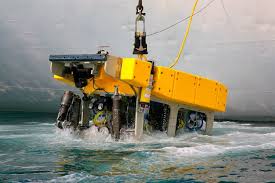Training Course on Ocean Technology
Training Course on Ocean Technology offers a comprehensive dive into the latest trends, tools, and techniques in ocean science, marine robotics, remote sensing, and underwater exploration.

Course Overview
Training Course on Ocean Technology
Introduction
The global demand for sustainable marine solutions is propelling Ocean Technology into a future-defining frontier, blending innovation with environmental stewardship. This course offers a comprehensive dive into the latest trends, tools, and techniques in ocean science, marine robotics, remote sensing, and underwater exploration. As blue economy sectors grow, professionals equipped with oceanographic data skills, autonomous marine systems knowledge, and digital twin applications are becoming invaluable assets across industries.
Designed for forward-thinking individuals and institutions, this training integrates cutting-edge concepts like marine geoinformatics, AI-driven hydrography, climate-smart ocean engineering, and blue carbon technologies. Participants will engage in real-world simulations, gain practical insights into sustainable ocean development, and learn how to navigate the challenges and opportunities in ocean tech-driven economies.
Course duration
10 days
Course Objectives
- Understand the fundamentals of Ocean Technology and marine innovation.
- Analyze real-time oceanographic data using advanced sensors.
- Operate and manage autonomous underwater vehicles (AUVs) and ROVs.
- Apply satellite remote sensing and GIS mapping to marine environments.
- Learn sustainable offshore engineering and infrastructure resilience.
- Explore digital twin technology in marine systems modeling.
- Identify and mitigate marine pollution using smart sensors.
- Gain insights into climate-smart marine strategies and blue economy trends.
- Understand the principles of ocean acoustics and underwater communication.
- Apply big data analytics in marine research and decision-making.
- Build capacity in maritime cybersecurity for smart ocean systems.
- Learn best practices for marine renewable energy systems.
- Promote collaborative ocean governance using open data tools.
Organizational Benefits
- Enhanced capacity for marine research and innovation
- Development of sustainable ocean management strategies
- Improved coastal resilience through advanced forecasting tools
- Stronger interdisciplinary teams bridging tech and marine science
- Increased competitiveness in blue economy sectors
- Future-ready workforce skilled in smart marine infrastructure
Target Participants
- Marine Scientists & Oceanographers
- Coastal Engineers & Environmental Scientists
- Maritime Policy Makers
- Data Analysts in Ocean Research
- GIS and Remote Sensing Professionals
- Civil & Offshore Engineers
- Students in Marine Technology Fields
- Blue Economy Entrepreneurs
Course Outline
Module 1: Introduction to Ocean Technology
- History and evolution
- Components and systems
- Current trends
- Relevance to the blue economy
- Career pathways
Module 2: Oceanographic Data Collection
- CTD sensors
- Profiling floats
- Real-time buoy systems
- Data logging software
- Quality control methods
Module 3: Marine Robotics (AUVs & ROVs)
- Design and functionality
- Deployment strategies
- Navigation and mapping
- Use cases and case studies
- Maintenance and troubleshooting
Module 4: Satellite Remote Sensing
- Ocean color and temperature
- Altimetry and bathymetry
- SAR for marine applications
- Coastal zone monitoring
- Data interpretation tools
Module 5: Marine GIS & Mapping
- Introduction to GIS tools
- Spatial analysis
- Data integration
- Sea-floor mapping
- 3D visualization
Module 6: Underwater Communication
- Acoustic modems
- Signal propagation
- Data transmission systems
- Latency and reliability
- Use in ROV coordination
Module 7: Marine Renewable Energy
- Tidal energy systems
- Offshore wind technology
- Ocean thermal energy conversion
- Environmental impacts
- Policy and investment trends
Module 8: Blue Carbon and Sustainability
- Mangroves and seagrasses
- Carbon offset frameworks
- Monitoring methods
- Restoration strategies
- Valuation and trading
Module 9: Marine Pollution Detection
- Oil spill monitoring
- Microplastics tracking
- Real-time sensors
- AI-based detection
- Mitigation systems
Module 10: Digital Twin for Oceans
- Concepts and frameworks
- Real-time data integration
- Predictive modeling
- Infrastructure optimization
- Future scenarios
Module 11: Big Data & Marine Analytics
- Data sources
- Analytical tools
- Predictive algorithms
- Decision support systems
- Visual dashboards
Module 12: Smart Ports & Logistics
- Automation technologies
- IoT in port management
- Green shipping trends
- Traffic optimization
- Case studies
Module 13: Coastal Engineering Innovation
- Climate-resilient designs
- Smart breakwaters
- Flood prediction systems
- Shoreline stabilization
- Environmental impact assessment
Module 14: Maritime Cybersecurity
- Threat landscapes
- Security frameworks
- AI-based threat detection
- Protocols and compliance
- Case studies
Module 15: Ocean Governance & Ethics
- Legal frameworks (UNCLOS)
- Ethical exploration
- Indigenous knowledge integration
- Data sharing policies
- Collaborative initiatives
Training Methodology
- Instructor-led live sessions
- Hands-on simulation and virtual labs
- Real-world project-based assessments
- Group collaboration and breakout sessions
- Case study reviews and expert guest lectures
Register as a group from 3 participants for a Discount
Send us an email: info@datastatresearch.org or call +254724527104
Certification
Upon successful completion of this training, participants will be issued with a globally- recognized certificate.
Tailor-Made Course
We also offer tailor-made courses based on your needs.
Key Notes
a. The participant must be conversant with English.
b. Upon completion of training the participant will be issued with an Authorized Training Certificate
c. Course duration is flexible and the contents can be modified to fit any number of days.
d. The course fee includes facilitation training materials, 2 coffee breaks, buffet lunch and A Certificate upon successful completion of Training.
e. One-year post-training support Consultation and Coaching provided after the course.
f. Payment should be done at least a week before commence of the training, to DATASTAT CONSULTANCY LTD account, as indicated in the invoice so as to enable us prepare better for you.